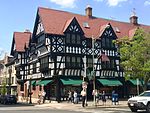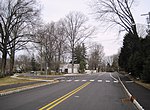Princeton is a municipality with a borough form of government in Mercer County, in the U.S. state of New Jersey. It was established on January 1, 2013, through the consolidation of the Borough of Princeton and Princeton Township, both of which are now defunct. As of the 2020 United States census, the borough's population was 30,681, an increase of 2,109 (+7.4%) from the 2010 census combined count of 28,572. In the 2000 census, the two communities had a total population of 30,230, with 14,203 residents in the borough and 16,027 in the township.Princeton was founded before the American Revolutionary War. The borough is the home of Princeton University, which bears its name and moved to the community in 1756 from the educational institution's previous location in Newark. Although its association with the university is primarily what makes Princeton a college town, other important institutions in the area include the Institute for Advanced Study, Princeton Plasma Physics Laboratory, Princeton Theological Seminary, Opinion Research Corporation, Bristol-Myers Squibb, Siemens Corporate Research, SRI International, FMC Corporation, The Robert Wood Johnson Foundation, Amrep, Church and Dwight, Berlitz International, and Dow Jones & Company.
Princeton is roughly equidistant from New York City and Philadelphia. It is close to many major highways that serve both cities (e.g., Interstate 95 and U.S. Route 1), and receives major television and radio broadcasts from each. It is also close to Trenton, New Jersey's capital city, New Brunswick and Edison.
The New Jersey governor's official residence has been in Princeton since 1945, when Morven in what was then Princeton Borough became the first governor's mansion. In 1982, it was replaced by the larger Drumthwacket, a colonial mansion located in the former township, but not all have actually lived in these houses. Morven became a museum property of the New Jersey Historical Society.Princeton was ranked 15th of the top 100 towns in the United States to Live In by Money magazine in 2005.Throughout much of its history, the community was composed of two separate municipalities: a township and a borough. The central borough was completely surrounded by the township. The borough seceded from the township in 1894 in a dispute over school taxes; the two municipalities later formed the Princeton Public Schools, and some other public services were conducted together before they were reunited into a single Princeton in January 2013. Princeton Borough contained Nassau Street, the main commercial street, most of the university campus, and incorporated most of the urban area until the postwar suburbanization. The borough and township had roughly equal populations.












